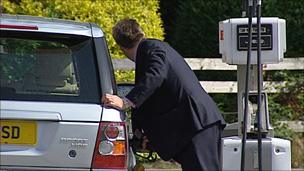Fuel prices 'crippling' for rural areas
- Published

Locals say higher fuel costs in the Highlands are having an impact on all aspects of life
Ullapool is nearly 2,000 miles from Tripoli but even here you can feel the ripples of revolution.
With turmoil in the Middle East forcing up the price of oil, the cost of fuel at the pump is also rising.
According to the website www.petrolprices.com, external a litre of unleaded in Ullapool, in the north west of Scotland, currently costs 139.9p, while diesel is 146.9p - more than 10p higher than in the cities.
"It's such a shocker," said Paula Gordon, who runs the Sleepy Hollow Smokehouse with her husband Alistair.
The family firm in Aultbea, on the shores of Loch Ewe, sells smoked salmon and haddock all over Europe and just down the road.
But Mr Gordon said it now costs more to send deliveries by courier to Glasgow than it does to fly them to Italy.
And Mrs Gordon laments the fuel price pressures on every aspect of their business.
She said: "The price affects the price of our fish, the cost of getting our fish to us, the cost for Loch Duart who grow our fish for us, the price of getting fish food up to them, everything."
She warns the chancellor George Osborne that going ahead with plans to raise fuel duty in his budget later this month would be "crippling" for firms in rural areas.
Forecourt closures
That's a common view at the nearby filling station in Gairloch.
There is no sign on the forecourt proclaiming the price, but postman James Johnston doesn't need one to know that he's losing out.
"I've noticed a vast increase in the price of fuel," he said.
"To fill the van it's a good 10 quid more. It's going to make the price of everything dearer: letters, transport, everything."
And yet the petrol retailers are not profiting. Far from it. High prices have cut forecourt sales, forcing many out of business.
According to analysts Experian Catalist, the number of filling stations in the UK has fallen by more than 4,000 in the past decade.
In 2000 there were 13,107 but by 2010 there were just 8,787, despite a rise in the number of supermarket filling stations.
Rhona Rollo, who works at a Wester Ross secondary school, said there was a dilemma: pay more to fill up locally or travel further afield and watch local firms go out of business.
"The price of fuel here is horrendous," she said.
"People talk about the average price of fuel. They don't pay attention to the west coast or the islands so we feel kind of hard done by.
"This year we'll see a difference in tourism. It's bound to have a knock-on effect."
Ms Rollo is just one voice among many here calling for the UK government to relieve the pressure by reducing fuel duty.
Since October the Treasury has been promising to introduce a pilot scheme which would cut duty in the most remote areas by 5p per litre.
Discussions in Brussels about the subsidy, which would have to be approved by all European Union member states, are "progressing well" according to a Treasury spokesman.
But, initially at least, it would apply only to the Hebrides, the Northern Isles and the Isles of Scilly, not the most remote parts of the Scottish mainland.
The wet and windy Highlands may be a long way from the Middle East but, like much of the world, its fate is closely tied to events in the dry and dusty deserts of Arabia.
- Published2 March 2011
- Published7 February 2011
- Published16 January 2011
- Published5 January 2011
- Published14 January 2011